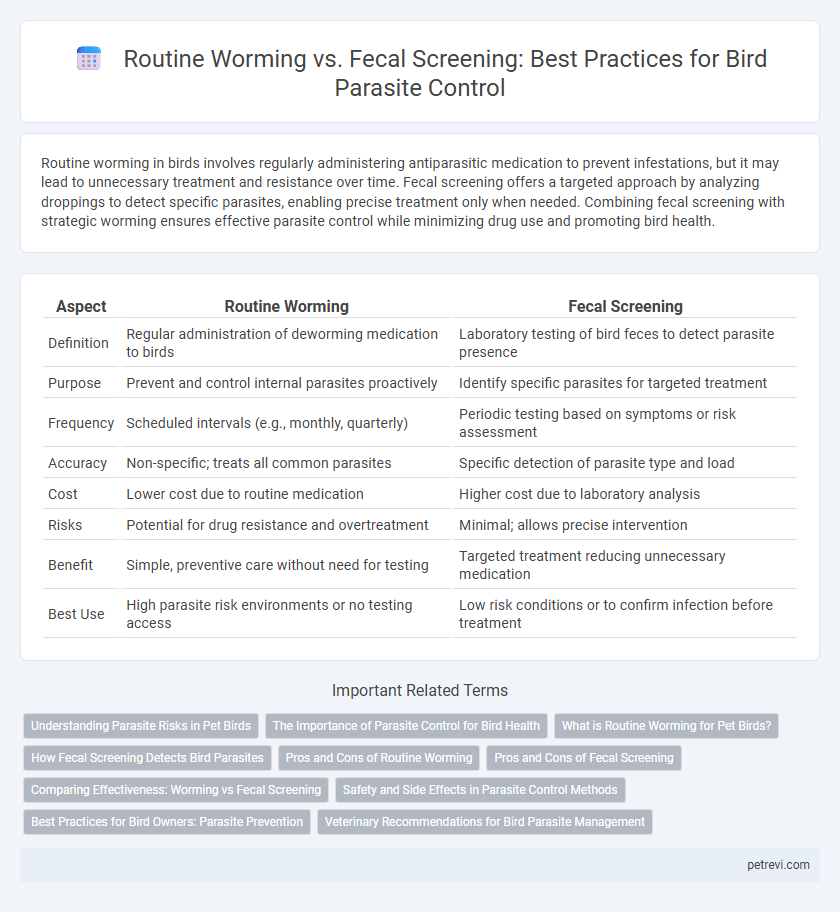Routine worming in birds involves regularly administering antiparasitic medication to prevent infestations, but it may lead to unnecessary treatment and resistance over time. Fecal screening offers a targeted approach by analyzing droppings to detect specific parasites, enabling precise treatment only when needed. Combining fecal screening with strategic worming ensures effective parasite control while minimizing drug use and promoting bird health.
Table of Comparison
| Aspect | Routine Worming | Fecal Screening |
|---|---|---|
| Definition | Regular administration of deworming medication to birds | Laboratory testing of bird feces to detect parasite presence |
| Purpose | Prevent and control internal parasites proactively | Identify specific parasites for targeted treatment |
| Frequency | Scheduled intervals (e.g., monthly, quarterly) | Periodic testing based on symptoms or risk assessment |
| Accuracy | Non-specific; treats all common parasites | Specific detection of parasite type and load |
| Cost | Lower cost due to routine medication | Higher cost due to laboratory analysis |
| Risks | Potential for drug resistance and overtreatment | Minimal; allows precise intervention |
| Benefit | Simple, preventive care without need for testing | Targeted treatment reducing unnecessary medication |
| Best Use | High parasite risk environments or no testing access | Low risk conditions or to confirm infection before treatment |
Understanding Parasite Risks in Pet Birds
Routine worming in pet birds involves scheduled anthelmintic treatments aimed at preventing common parasitic infections, but it may lead to unnecessary medication if parasite presence is low or absent. Fecal screening offers precise identification of parasite eggs or larvae in bird droppings, allowing for targeted treatments that reduce drug resistance and ensure bird health. Understanding parasite risks involves considering species susceptibility, environmental exposure, and hygiene practices to determine whether routine worming or fecal screening provides the most effective and safe parasite control strategy.
The Importance of Parasite Control for Bird Health
Effective parasite control in birds is crucial for maintaining their overall health, as internal parasites like worms can lead to malnutrition, weakened immunity, and respiratory issues. Routine worming offers proactive elimination of common parasites, while fecal screening provides precise identification of specific infestations, enabling targeted treatment. Combining both methods ensures comprehensive parasite management, reducing the risk of resistance and promoting optimal bird wellness.
What is Routine Worming for Pet Birds?
Routine worming for pet birds involves regularly administering antiparasitic medications to prevent or treat internal parasites without prior diagnostic testing. This proactive approach targets common parasites such as roundworms and tapeworms to maintain the bird's health and prevent infestations. Unlike fecal screening, routine worming does not rely on detecting parasite eggs or larvae in droppings before treatment.
How Fecal Screening Detects Bird Parasites
Fecal screening detects bird parasites by analyzing stool samples for parasite eggs, larvae, or oocysts under a microscope, providing precise identification of specific infestations. This method allows targeted treatment by revealing the parasite type and load, unlike routine worming, which administers broad-spectrum medication without confirming infection. Regular fecal examinations enhance parasite control efficiency, minimizing drug resistance and promoting bird health through tailored interventions.
Pros and Cons of Routine Worming
Routine worming in birds offers the advantage of proactive parasite control, reducing the risk of heavy infestations and associated health issues like anemia and weight loss. However, overuse of routine worming can lead to drug resistance in parasites and unnecessary medication exposure. Unlike fecal screening, which targets treatment based on detected parasite eggs, routine worming lacks diagnostic precision and may result in overtreatment.
Pros and Cons of Fecal Screening
Fecal screening detects specific parasitic infections in birds with high accuracy, allowing for targeted treatment and reducing unnecessary medication use. This method helps prevent drug resistance and minimizes stress on birds by avoiding routine, blanket worming protocols. However, fecal screening requires consistent sample collection and professional analysis, which may increase costs and delay treatment compared to routine worming schedules.
Comparing Effectiveness: Worming vs Fecal Screening
Routine worming in birds involves scheduled administration of antiparasitic medications to prevent infestations, but may lead to unnecessary drug use and resistance when parasites are absent. Fecal screening offers targeted parasite control by accurately identifying parasite presence and load, allowing for precise treatment and reducing drug overuse. Studies reveal fecal screening enhances parasite management efficacy by tailoring interventions, promoting bird health while minimizing medication risks.
Safety and Side Effects in Parasite Control Methods
Routine worming in birds involves administering broad-spectrum anthelmintics at regular intervals, offering a convenient approach but posing risks of drug resistance and potential side effects such as toxicity and disruption of gut flora. Fecal screening for parasite control targets treatments based on specific parasite detection, minimizing unnecessary drug exposure and reducing the risk of adverse reactions, thus enhancing safety. Selecting fecal screening as a parasite control method supports more precise intervention, safeguarding bird health by avoiding the blanket use of anthelmintics and the associated side effects.
Best Practices for Bird Owners: Parasite Prevention
Routine worming without prior testing can lead to unnecessary medication and potential resistance in bird parasites, making fecal screening a more precise method for identifying infestations. Regular fecal examinations detect parasite eggs or oocysts, enabling targeted treatments that minimize health risks and chemical exposures. Bird owners should implement scheduled fecal screenings combined with proper hygiene and habitat maintenance to optimize parasite prevention and promote avian well-being.
Veterinary Recommendations for Bird Parasite Management
Veterinary guidelines emphasize fecal screening over routine worming for effective bird parasite control, as targeted treatment minimizes drug resistance and avoids unnecessary medication. Regular fecal examinations allow early detection of specific parasites, enabling precise and timely interventions tailored to the bird's health status. This approach supports sustainable parasite management and promotes overall avian well-being in both pet and aviary settings.
Routine worming vs Fecal screening for Bird parasite control Infographic

 petrevi.com
petrevi.com